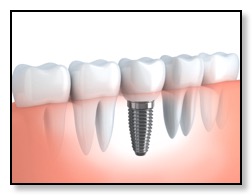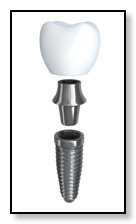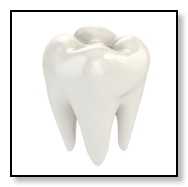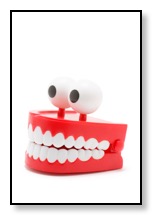What is a Dental Implant?

A dental implant may be an option for you if you have a missing tooth, or a tooth that needs to be removed. It can also serve as a foundation for a dental bridge and a better alternative to dentures. A dental implant is embedded into your jaw bone as a permanent replacement tooth that matches your other natural teeth.
The failing tooth is extracted, and the implant fixture is placed (see photo). The root of the implant is a titanium post that is implanted within the empty tooth socket. As your jawbone heals from the surgery, the bone naturally grows around the metal post, securing it to your jaw. Once this implant heals or “integrates” with your natural bone, the doctor will place an abutment and crown to match your natural adjacent teeth.

Nearly everyone who is healthy enough to undergo oral surgery is a good candidate for a dental implant. In order to ensure that the procedure is successful, there should be enough bone within the jaw to hold the implant in place. This is determined during your no-charge implant consultation with Dr. Tsai.
There are some patients, such as those who suffer from diabetes and heart disease or those who have periodontal disease, who should be evaluated to find out if they are fit candidates for the dental surgery. Finally, patients who smoke should also be carefully evaluated as smoking and implants do not do well together.

Many patients ask if there are other potentially less-expensive options - like bridges or dentures - to a dental implant. The answer is usually yes. However, there are downsides or drawbacks to these other treatments. Bridges and dentures are much more difficult to maintain and keep clean, and they don’t always give patients the best fit, feel, and look.
In general, dental implants last longer, look more natural, and have become the standard of dental care for those who have lost their teeth. As always, it is best to discuss these options with Dr. Tsai to make the best decision for you.


However, sometimes patients are not able to have multiple implants, and thus choose to have an implant-retained denture made. This way, they have the benefit of the implants being fixed along with the full set of teeth from the denture. Dr. Tsai can talk with you further about this.

Allergic reactions to the titanium posts within a dental implant are very, very, rare but it can happen. Medical-Grade Titanium is considered to be biologically inert, meaning it will not trigger your immune system. However, if you know you have an allergy to metals, contact an allergist for testing before undergoing surgery for dental implants. This way you can be sure.

Yes, dental implants can replace any tooth in your mouth. Though some teeth are simpler to replace than others, all of them can be replaced if needed. Dr. Tsai will use a different type of implant, depending on several factors, such as the location of the implant, how much bone is available, location of your sinus floor, adjacent tooth location, and periodontal condition (gums).

Dental implant healing time (or integration time) varies from patient to patient. In general, it takes about three to six months for the dental implant to heal. However, if the extraction was difficult, or a bone graft or sinus lift was required, it can take longer.
Once it heals and the post is secure, an abutment, or a small connecting post, is attached to the titanium post to hold your new tooth in place, and the crown is placed. There is no healing time required for the abutment and crown.

No. When done properly, dental implants will look as natural as your own teeth. Dr. Tsai will use various methods to match the color, shade, gradient, shape, etc. of your existing teeth with the new dental implant crown.
In the end, it will be almost impossible to tell you have a dental implant when you flash your smile. Click below to take a look at some photos, as well as the wax-up process used to create and repair smiles with crowns, veneers, and implants.

Yes. Many people don’t know this, but fental implants, like your natural teeth, stimulate the creation of more bone within your jaw bone as you chew and exert pressure on your teeth. Just like when you exercise, bone replacement and creation is stimulated. When you lose teeth, you begin to lose bone in your jaw.
This can affect your facial bone structure, which affects your appearance. More specifically, the localized bone loss affects the adjacent teeth, causing them to tip in or loose support. A properly placed dental implant can minimize or resolve this issue.

No. You treat dental implants just like you would your other healthy teeth. Since dental implants don't require other teeth to be removed, like a dental bridge often does, it helps to keep your smile healthier. Dental implants allow for better access between your teeth, which also improves your oral health. You'll need to continue to brush and floss your teeth, and get regular dental check-ups, just as you would do with your natural teeth. Occasionally, you should have a dentist check your implant, but otherwise you'll quickly feel it's a part of your own natural teeth.
We offer a no-charge second opinion1 (or first opinion if you would like) to discuss the option of dental implants. We do limit the number of these appointments and also limit the time allowed with the doctor. In some cases we may take an X-ray or CT Scan to better understand the local bone thickness/support, as well as the adjacent root structure. We will also provide you with a treatment plan and cost estimate at this time.
» Oral Surgeons and Dental Implants
» All Ceramic Dental Implants
» Dental Implants, Bridges, Crowns, & Partial Dentures
» Bone Grafting & Sinus Lifts
» Second Opinions for Dental Implants
» Cracked Tooth Syndrome
» Frequently Asked Questions about Dental Implants
» How to calculate your dental insurance copays?
» Before and After photos of our patients
» Z-SYSTEMS® All Ceramic Dental Implants
Have questions about dental implants or mini dental implants?
email or call us: (650)-583-5880
We'd love to hear from you.
📩
Send us Email
📅
Request Appointment
1Consultation is for new placement dental implant related treatment only.